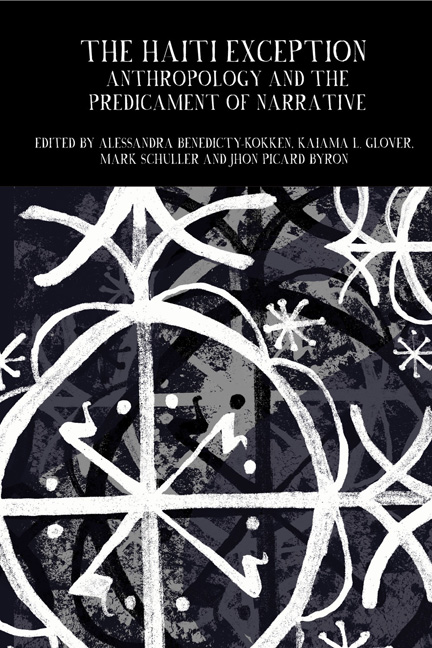Book contents
- Frontmatter
- Contents
- Editors’ Introduction
- I Tracing Intellectual Histories
- II Interrogating the Enquiring Self
- III On Nation-Building: Histories, Theories, Praxes
- Haiti, Politics and Sovereign (Mis)recognitions
- Haitian Culture in the Informational Economies of Humanitarian Aid
- Urban Poetics
- Epilogue: Kalfou Danje: Situating Haitian Studies and My Own Journey within It
- Notes on Contributors
- Index
Haitian Culture in the Informational Economies of Humanitarian Aid
from III - On Nation-Building: Histories, Theories, Praxes
- Frontmatter
- Contents
- Editors’ Introduction
- I Tracing Intellectual Histories
- II Interrogating the Enquiring Self
- III On Nation-Building: Histories, Theories, Praxes
- Haiti, Politics and Sovereign (Mis)recognitions
- Haitian Culture in the Informational Economies of Humanitarian Aid
- Urban Poetics
- Epilogue: Kalfou Danje: Situating Haitian Studies and My Own Journey within It
- Notes on Contributors
- Index
Summary
When the earthquake hit Port-au-Prince in January of 2010, I had just left my Kreyòl lesson at a school inside the crowded and sinuous alleyways of the Solino neighbourhood. My teachers were members of a grassroots solidarity organization who, two years prior, had been my students in a seminar I was teaching on Frantz Fanon, part of their popular university programme. To conclude my lesson on 12 January 2010, they had taught me a Kreyòl proverb, carefully spelling it out onto the chalkboard: bat bliye, kò songe [the stick or weapon forgets, but the body remembers]. After the lesson, my teachers saw me onto a crowded tap-tap and waved goodbye, and the earthquake hit as the makeshift bus travelled up the narrow street of Poste Marchande. In the turmoil that followed, I forgot ever learning the proverb. But a few months after the quake, on my first trip back to Haiti and the now half-destroyed schoolroom, the words were still visible on the chalkboard, seemingly prescient of what was to come.
In the months following the quake, I returned to Haiti regularly. I was pursuing a new research project on post-earthquake spaces as spaces of exception, the phenomenon of the squalid tent cities and their relationship to the gated compounds of the foreign aid community (my pre-quake project on literary and media representations of the political turmoil of 2004 no longer seemed relevant). I was also trying to help, to combine research with praxis, and I was doing neither terribly well. I was also trying to get back some of my Kreyòl : the chalkboard in Solino seemed to remember more than I could, and I was certain that whatever I had learned had been knocked out of my head by the earthquake, an event that my body remembered all too well.
My post-earthquake research and solidarity work led me to a housing rights activist coalition, a collective of various Haitian grassroots organizations that included my Kreyòl teachers. The coalition was working to mobilize the masses of displaced people (peaking at 1.5 million) by educating them on their rights to housing guaranteed by the 1987 constitution and on the illegality of forced evictions.
- Type
- Chapter
- Information
- The Haiti ExceptionAnthropology and the Predicament of Narrative, pp. 156 - 176Publisher: Liverpool University PressPrint publication year: 2016



